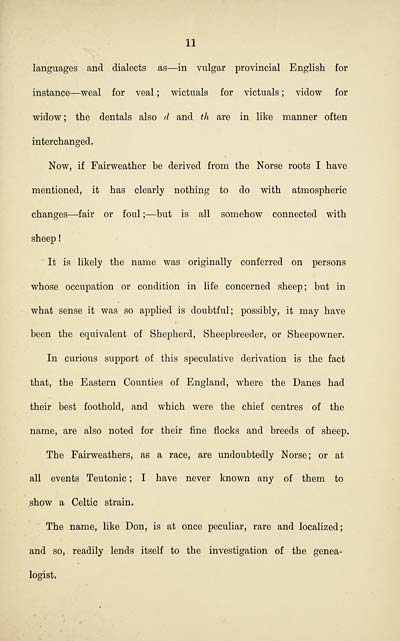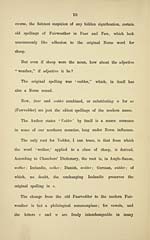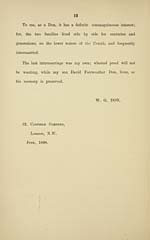Memorandum regarding the Fairweathers of Menmuir Parish, Forfarshire, and others of the surname
(15) Page 11
Download files
Complete book:
Individual page:
Thumbnail gallery: Grid view | List view

11
languages and dialects as— in vulgar provincial English for
instance— weal for veal ; wictuals for victuals ; vidow for
widow ; the dentals also d and th are in like manner often
interchanged.
Now, if Fairweather be derived from the Norse roots I have
mentioned, it has clearly nothing to do with atmospheric
changes — fair or foul ; — but is all somehow connected with
sheep !
It is likely the name was originally conferred on persons
whose occupation or condition in life concerned sheep; but in
what sense it was so applied is doubtful; possibly, it may have
been the equivalent of Shepherd, Sheepbreeder, or Sheepowner.
In curious support of this speculative derivation is the fact
that, the Eastern Counties of England, where the Danes had
their best foothold, and which were the chief centres of the
name, are also noted for their fine flocks and breeds of sheep.
The Fairweathers, as a race, are undoubtedly Norse; or at
all events Teutonic ; I have never known any of them to
show a Celtic strain.
The name, like Don, is at once peculiar, rare and localized;
and so, readily lends itself to the investigation of the genea-
logist.
languages and dialects as— in vulgar provincial English for
instance— weal for veal ; wictuals for victuals ; vidow for
widow ; the dentals also d and th are in like manner often
interchanged.
Now, if Fairweather be derived from the Norse roots I have
mentioned, it has clearly nothing to do with atmospheric
changes — fair or foul ; — but is all somehow connected with
sheep !
It is likely the name was originally conferred on persons
whose occupation or condition in life concerned sheep; but in
what sense it was so applied is doubtful; possibly, it may have
been the equivalent of Shepherd, Sheepbreeder, or Sheepowner.
In curious support of this speculative derivation is the fact
that, the Eastern Counties of England, where the Danes had
their best foothold, and which were the chief centres of the
name, are also noted for their fine flocks and breeds of sheep.
The Fairweathers, as a race, are undoubtedly Norse; or at
all events Teutonic ; I have never known any of them to
show a Celtic strain.
The name, like Don, is at once peculiar, rare and localized;
and so, readily lends itself to the investigation of the genea-
logist.
Set display mode to:
![]() Universal Viewer |
Universal Viewer | ![]() Mirador |
Large image | Transcription
Mirador |
Large image | Transcription
Images and transcriptions on this page, including medium image downloads, may be used under the Creative Commons Attribution 4.0 International Licence unless otherwise stated. ![]()
| Histories of Scottish families > Memorandum regarding the Fairweathers of Menmuir Parish, Forfarshire, and others of the surname > (15) Page 11 |
|---|
| Permanent URL | https://digital.nls.uk/94897378 |
|---|
| Description | A selection of almost 400 printed items relating to the history of Scottish families, mostly dating from the 19th and early 20th centuries. Includes memoirs, genealogies and clan histories, with a few produced by emigrant families. The earliest family history goes back to AD 916. |
|---|

